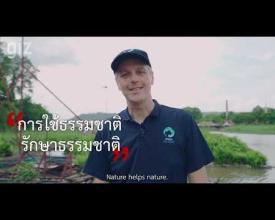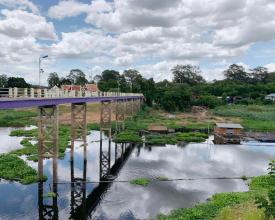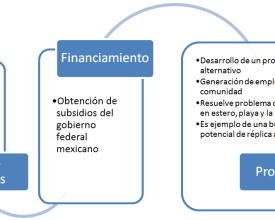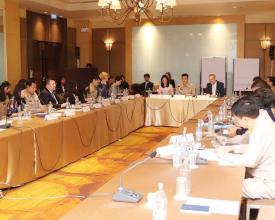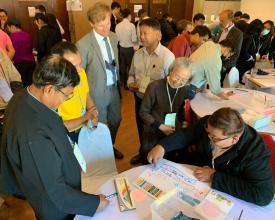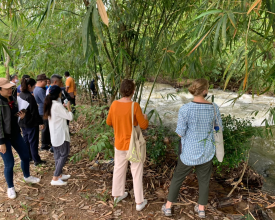
Fostering Ecosystem-based Adaptation in River Basin Planning for Yom and Sakaekrang River Basins in Thailand
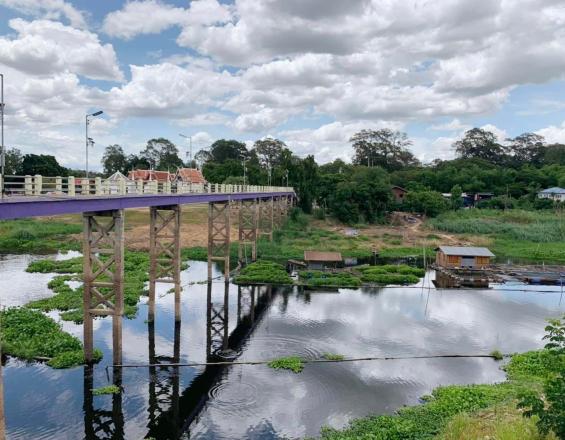
Yom and Sakae Krang river basins are located in the lower North and the central part of Thailand and are highly vulnerable to the impacts of climate change. Water flows in the Yom and Sakae Krang River Basin strongly vary between floods in the rainy season and drought in the dry season which adversely affects the livelihood of local people along the up-, mid-, and downstream of Yom and Sakaekrang. To help enhance water security and address climate risks, the Thai water sector has been supported
- to systematically integrate Ecosystem-based Adaptation (EbA) into river basin planning processes,
- to build technical capacities of relevant stakeholders,
- to engage stakeholders from the national to local levels and across water-related sectors in multistakeholder collaboration, and
- to develop technical guidance documents to support planning and implementation of EbA measures on the ground.
Contexte
Challenges addressed
Yom and Sakae Krang river basins are highly vulnerable to droughts in the dry season and floods in the rainy season which adversely affects the livelihood of communities along the up-, mid-, and downstream of the rivers. While water security is high on the political agenda, relevant stakeholders still have limited understanding on the long-term impacts of climate change. EbA is also new to Thailand’s water sector that believes in the prevalence of grey, engineering solutions for water management. Furthermore, readily available evidence-based information on the costs and benefits of EbA to address climate-induced floods and droughts is still limited. These challenges call for a systematic integration of climate-sensitive water management into policy and planning processes, and support for multistakeholder cooperation and technical capacities at the national and river basin levels to apply EbA approaches, in order to increase adaptive capacity to floods and droughts and enhance long-term climate resilience.
Emplacement
Traiter
Summary of the process
Mainstreaming climate change adaptation (CCA) and EbA on the national and river basin levels builds on comprehensive technical and institutional capacity building and the participatory elaboration of an interconnected series of knowledge management products. While the development of a national guideline for climate-sensitive river planning will set the regulatory framework for the River Basin Committees to engage in climate-sensitive basin planning with EbA as a key strategy for adaptation, the capacity development programme and knowledge products make all involved stakeholders fit to engage in identifying, selecting, planning and implementing EbA. At the same time, the capacity building and the elaboration of knowledge products are based on participatory approaches and enhancement of multistakeholder cooperation and exchange between policymakers, practitioners and local stakeholders and benefit from guidance by national and international experts providing technical know-how and best-practices. The multilevel and interconnected approach reflected in the building blocks pave the way for broader uptake of EbA as an adaptation and water management strategy in Thailand.
Building Blocks
Integration of climate change adaptation and EbA into the water policy framework
Mainstreaming climate change adaptation (CCA) and EbA into water policies and plans is central for climate resilience in the Thai water sector. The key to this was the strengthening of inter-agency cooperation between ONWR and ONEP, the lead agencies on water and on climate change. Efforts to enhance mainstreaming and cross-sectoral cooperation included:
- Enhancing understanding on Thailand’s climate policy framework as well as on the topic of CCA in the water sector as a basis for EbA through policy dialogues and informal exchanges between ONEP and ONWR as well as with water-related agencies.
- Developing a rapid self-assessment tool (‘5 Dimension Framework’) to help water policy makers identify current levels and possible areas for further mainstreaming of CCA and EbA.
- Developing policy recommendations in a policy brief series to enhance understanding of the needs and benefits of integrating adaptation in the water sector and making EbA as an essential pillar for sustainable and climate-sensitive water management.
Developing a national guideline for the development of climate-sensitive River Basin Master Plans (RBMPs) integrating climate change aspects including EbA, Monitoring & Evaluation (M&E), and climate finance options into the planning process that takes place in 5-year intervals in Thailand’s 22 river basins.
Enabling factors
- A high-level Policy Dialogue between ONWR and ONEP, the lead agencies on water and climate change, emphasised the need for cross-agency and multi-level collaboration to drive Thailand’s climate-resilient water resources management.
- Extreme drought during 2019/2020 together with an increasing number of floods due to heavy rainfalls in the wet season put adaptation high on the political agenda and provided a window of opportunity to raise the water sector’s awareness on the need to integrate climate adaptation and complement water management with EbA solutions.
Lesson learned
- Alignment of policies and plans on water resources management and climate change is a key basis for ensuring that the climate-sensitive water resources management will be in an integrated manner and go in the same direction.
- Providing a platform to exchange and emphasize the need for cross-agency and multi-level collaboration helps to enhance the integration of climate change adaptation and EbA into the water policy framework.
Capacity Development Programme (CDP) on Cooperation Management for climate-sensitive Integrated Water Resource Management (IWRM) and EbA
Thailand’s Water Resources Act that came into effect in 2019 enhanced the roles of the River Basin Committees (RBCs) in Thailand’s 22 river basins. The RBCs – consisting of representatives from different agencies and sectors, water user organizations representing civil society and the private sector – are now the key actors in the multi-stakeholder development of the River Basin Master Plans (RBMPs).
Subsequently, ONWR and GIZ developed a comprehensive Capacity Development Programme (CDP) aiming to strengthen the technical and institutional capacity of the RBCs to develop “climate-sensitive River Basin Master Plans”, that include adaptation to climate change and EbA as guiding principles.
The CDP focuses on two main aspects: capacity building on (1) Climate Risk and Vulnerability Assessments and integrating the EbA planning cycle in the RBMP development and (2) “Management and Planning Process Facilitation” which aims to strengthen the management and communication know-how and skills for key stakeholders in the RBMP process based on a participatory approach.
To maintain and extend this know-how, the CDP also supports the development of a trainer/facilitator pool and Training-of-Trainer activities that strengthen key skill sets in the RBMP development.
Enabling factors
- Support from the National Water Resources Committee (NWRC) encouraging water-related agencies to ensure participation in the CDP.
- Building on previous international cooperation that took first steps to introduce EbA, government officials and local stakeholders voiced interest to attain further information and know-how.
- Calls to complement large infrastructure water management with nature-based and small-scale solutions as well as increasingly manifesting impacts of climate change led the national water agency to consider new solutions more actively.
Lesson learned
It is expected that after the complete implementation of this solution, the overall technical knowledge and skills as well as enhanced processes for EbA selection, design and implementation will have been strengthened for relevant personnel and organizations. This will significantly help equip the RBCs, the key planning body in multi-stakeholder river basin processes, with required knowledges and skills to develop climates-sensitive RBMP which will lead to enhanced sustainable management of water in Thailand.
Engaging stakeholders for enhancing collaboration and creating ownership
To foster multi-level and cross-sectoral collaborations and create ownership in river basin management, an inclusive and multi-stakeholder approach was fostered to effectively address water-related climate risks on the ground. This includes working closely with public agencies across sectors at both national and sub-national levels, experts, and local water users.
These relevant agencies include, for example, the Office of National Water Resources (ONWR), the Royal Irrigation Department (RID), Department of Water Resources (DWR), Department of Public Works and Town & Country Planning (DPT), and Department of Disaster Prevention and Mitigation (DDPM).
The Capacity Development Programme is a good opportunity and platform for government officers, water users, and local communities to contribute to the development of climate-sensitive water management at the river basin scale. With this training course, participants are able to understand and apply relevant tools for climate-resilient and sustainable water resources management that respond to the needs of local people in the context of climate change.
In addition, there is ongoing cooperation with universities and international experts that feeds up-to-date research and international best practices into the work on EbA in Thailand.
Enabling factors
- The Water Resources Act calls for closer cooperation among stakeholders, emphasizes participatory approaches and defines a stronger role for RBCs.
- Community leaders are open for different approaches to mitigate flood and drought risks. Integrating local knowledge into the planning process is an important factor for identifying suitable measures in a local context and fostering community ownership.
- Communities could favor small-scale green solutions in line with Thailand’s Sufficiency Economy Philosophy that uses local resources and know-how.
Lesson learned
As the implementation focuses on river basin management through the engagement with River Basin Committees which comprise representatives from different interest groups (civil society, academia, government), it enables the introduction of EbA to the water sector and supports the acceptance and ownership of the approach.
Developing guidance products for policymakers and practitioners
To support policymakers and practitioners in integrating CCA and EbA into planning and implementation processes, we are developing a series of guidance products which includes:
- a ‘River Basin Master Plan Process Toolbox’ which is a compilation of relevant concepts and tools to help run and facilitate effective and participatory processes, for example in meetings and workshops, for RBMP development and project planning in the context of climate-sensitive IWRM and EbA in river basins.
- an ‘EbA Guidebook’ which will be a guiding material for training Thai professionals in the water and other related sectors on Ecosystem-based Adaptation. In developing this guidebook, a series of workshops and on-the-job trainings are organized to ensure that practitioners are familiar with the concepts and able to integrate EbA into planning and management processes in river basins.
- an ‘EbA Code of Practice’ (EbA CoP) which is being developed in parallel to the Guidebook, is an essential part to support the implementation of EbA solutions on the ground. It offers blueprints of different EbA options and provides technical guidance on aspects such as design principles and cost-benefit analyses to practitioners and engineers in the Thai water sector.
Enabling factors
A growing number of publicly available publications on climate change adaptation in the water sector and on EbA allows for a rich pool of scientific and evidence-based information to draw on and to tailor to the Thai water sector context for the development of trainings, knowledge products and consultations with Thai water sector partners.
Lesson learned
Developing context-specific guidance products for policymakers and practitioners, accompanied by on-the-job trainings, is key to enhance knowledge on different aspects of EbA and help enable policymakers and practitioners to make informed decisions, which in turn increase the chances for uptake of EbA.
Impacts
- Increased awareness on ecosystem-based solutions to help adapt to the impacts of climate change; systematic capacity building and integration of EbA in planning processes contributes to climate resilience entailing positive economic and social effects for communities and fostering awareness for the benefits of sustainable ecosystem management.
- River Basin Committees are equipped with technical know-how to develop climate-sensitive river basin master plans that include EbA as a key adaptation strategy to reduce flood and drought risks.
- Multistakeholder cooperation that promotes a bottom-up approach in the river planning process and is based on local knowledge and balance of interests amongst stakeholders from different sectors and governing levels as well as from up-, mid-, and downstream in river basins is strengthened.
- Trainings and participatory approaches in carrying out climate risk assessments and subsequent identification and priorisation of suitable EbA measures, contributed to a fostered sense of ownership of local stakeholders for climate-sensitive river basin planning.
- The policy-science interface connecting research, knowledge and practical implementation of EbA in the water sector in Thailand has been enhanced.
Beneficiaries
- Representatives of national and sub-national agencies and members of River Basin Committees in the two pilot river basins who are in charge of river basin management
- River basin communities and downstream urban settlements as ultimate beneficiaries of EbA
Sustainable Development Goals
Story
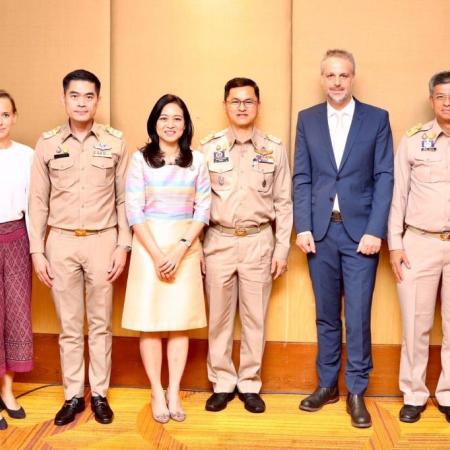
Recognising that climate change impact is already influencing Thailand’s water sector, the country has seen a leap in the cooperation between the agencies in charge of water: the Office of National Water Resources (ONWR) and climate change: the Office of Natural Resources and Environmental Policy and Planning (ONEP). While cooperation and exchange were rather limited before, the two agencies committed to strengthen cooperation activities in a Memorandum of Understanding (MoU) signed in 2018 and have since pursued the harmonisation of relevant policy frameworks.
“As Thailand’s water regulatory agency, ONWR needs to work closely with ONEP to mobilise the integration of climate change into the water sector. I hope that Thailand’s efforts will be recognised on the international stage when applying various [climate change adaptation] options and mechanisms in line with international standards” – Dr. Somkiat Prajumwong, Secretary General, ONWR.
In the 2018 MoU, the two agencies also agreed to issue a joint Policy Brief series to guide the water sector on priorities to integrate climate adaptation and EbA. This includes an alignment of relevant policies and plans at the national level, e.g., National Adaptation Plan and 20-Year Water Resources Management Master Plan, as well as a strong cooperation with the local-level River Basin Committees (RBCs) to ensure the integration of climate information and selection of respective adaptation actions for climate-sensitive river basin management.
A high-level Policy Dialogue between ONWR and ONEP was held on 2 December 2019 in Bangkok. The dialogue emphasized the need for cross-agency and multi-level collaboration, use of scientific climate and risk information, and data sharing among relevant agencies to make Thailand’s water resources management more climate-resilient in the face of the adverse impacts of climate change.
It is expected that the intensified inter-agency cooperation will strongly catalyze the uptake of adaptation and EbA approaches, building on systematic capacity building and enhanced planning processes that include EbA as a key adaptation strategy to reduce flood and drought risks in Thailand.
